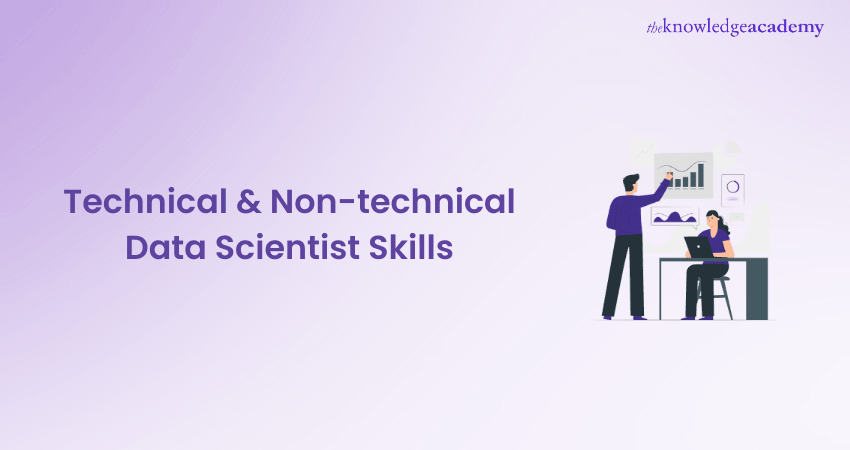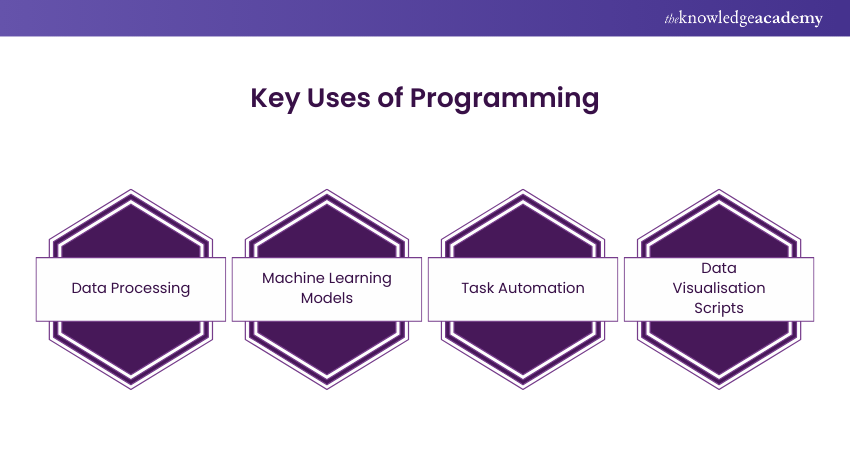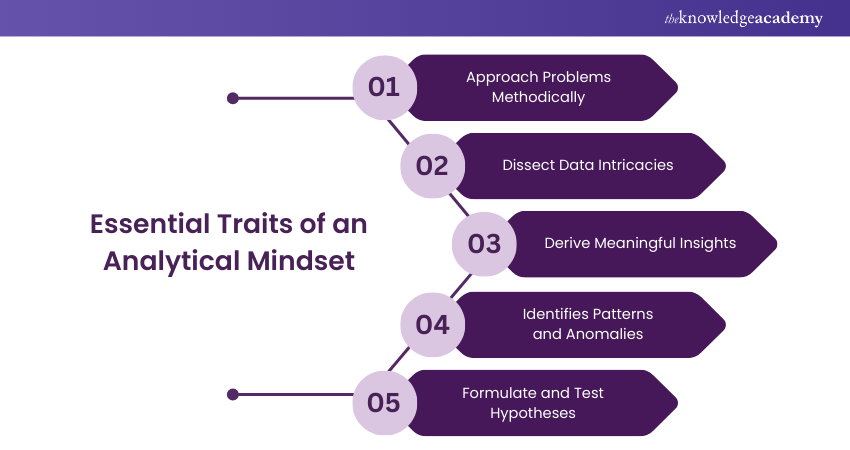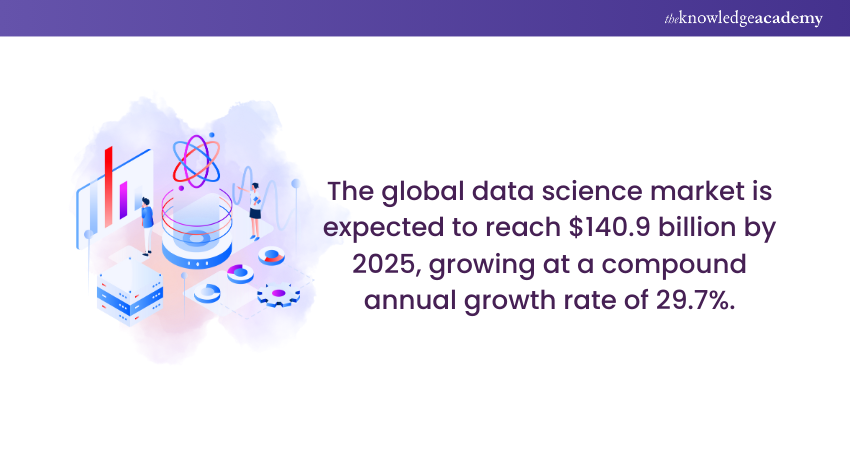We may not have the course you’re looking for. If you enquire or give us a call on +27 800 780004 and speak to our training experts, we may still be able to help with your training requirements.
We ensure quality, budget-alignment, and timely delivery by our expert instructors.

Have you ever thought about what makes a great Data Scientist? Data Scientist Skills are a mix of both technical and non-technical abilities that help them solve problems and find insights from Data.
From coding and Machine Learning to communicating clearly and thinking critically, these skills are key to success. In this blog, we discuss the essential Data Scientist Skills, why they’re important, and how you can improve them. It also covers the tips you need to succeed in this field.
Table of Contents
1) Who is a Data Science Professional?
2) Types of Data Science Skills
3) Exploring the Technical Skills Required for Data Scientists
4) Exploring the Non-technical Skills Required for Data Scientists
5) How to Improve Your Skills?
6) Conclusion
Who is a Data Science Professional?
A Data Science professional is a versatile and highly skilled individual who specialises in extracting actionable insights from vast and complex datasets. They play a pivotal role in Data Science, the multidisciplinary domain that combines various technical and analytical disciplines to make data-driven decisions.
Data Science professionals possess a unique blend of technical and non-technical skills, including proficiency in Programming Languages, Machine Learning (ML) Algorithms, Cloud Computing, analytical mindsets and strong communication skills. They often work with Big Data technologies and deep learning frameworks to tackle large-scale problems.
Furthermore, Data Science professionals are well-versed in ethical considerations surrounding data collection, storage, and analysis, ensuring that their work adheres to legal and ethical guidelines.
Types of Data Science Skills
Data Science skills are important for solving problems and making sense of data. These skills are divided into technical and non-technical categories, both of which are equally important.
Technical Skills in Data Science
Technical skills are the tools and techniques used to work with data. This includes programming languages like Python Programming or R Programming, which help in analysing and visualising data. Knowledge of Machine Learning and data handling tools is also crucial to building models and making predictions.
Non-technical Skills in Data Science
Non-technical skills involve how you think and communicate with others. Problem-solving and critical thinking are key to understanding data and finding solutions. Good communication skills help explain complex findings to people who don’t work in Data Science.
Ace Your Next Data Science Interview with these Data Science Interview Questions – Start Preparing Today!
Exploring the Technical Skills Required for Data Scientists
Below is a detailed list of the top technical Data Scientist Skills:
1) Programming
Programming is the ability to write code to work with data. It helps clean, analyse, and visualise data quickly and efficiently. Learning languages like Python and R is important for solving data problems.

Key Uses:
a) Write code to process and analyse data
b) Build and test Machine Learning models
c) Automate repetitive tasks to save time
d) Create scripts for data visualisation and reporting
2) Statistics and Probability
Statistics and probability help understand patterns and trends in data. These skills allow Data Scientists to make predictions and test ideas. They also ensure results are based on evidence, not guesses.
Key Uses:
a) Measure relationships between variables
b) Perform Hypothesis Testing in Data Science to check accuracy.
c) Use probability for risk assessment and forecasting
d) Apply statistical techniques to optimise decisions
3) Data Wrangling and Database Management
Data wrangling involves fixing messy data, while database management stores and organises it. Together, they make sure data is ready for analysis. These skills help in handling large amounts of data efficiently.
Key Uses:
a) Fix errors and inconsistencies in datasets
b) Combine data from different sources for analysis
c) Manage large databases with tools like SQL
d) Ensure data is structured and easy to access
4) Machine Learning and Deep Learning
Machine Learning helps computers learn from data without being explicitly programmed. Deep Learning, a part of Machine Learning, uses advanced techniques for complex tasks. These skills are used in things like predictions and automation.
Key Uses:
a) Train models to predict future outcomes
b) Build intelligent systems like recommendation engines
c) Solve complex problems with deep learning models
d) Automate data-driven tasks using Machine Learning
5) Data Visualisation
Data Visualisation turns raw data into charts, graphs, and visuals. It helps people understand insights quickly. It’s a great way to communicate findings to non-technical audiences.
Key Uses:
a) Create visuals to explain complex data simply
b) Use charts to show trends, patterns, and outliers
c) Build dashboards for real-time data monitoring
d) Help decision-makers understand data findings better
6) Cloud Computing
Cloud Computing gives access to online tools for storing and analysing data. It helps work with large datasets and run models faster. It’s also great for sharing work with team members remotely.
Key Uses:
a) Store large amounts of data securely online
b) Run data models on powerful cloud servers
c) Collaborate with teams using shared cloud platforms
d) Deploy Machine Learning models on live systems
Learn data analysis techniques with our Data Science With R Training – Join today!
Exploring the Non-technical Skills Required for Data Scientists
Non-technical skills are vital for a successful Data Scientist. Communication, Critical Thinking, and business acumen enable effective collaboration and align data projects with organisational goals. Ethical considerations ensure responsible data handling.
Lifelong learning ensures staying updated in this dynamic field. These skills complement technical expertise and foster success in Data Science. Here is a list of the non-technical Data Scientist Skills described in detail:
1) Communication
Data Scientists with good Communication Skills facilitate the clear and effective transmission of complex findings to both technical and non-technical stakeholders. Data Scientists must convey insights, methodologies, and implications in a way that is easily understood.
This skill enables better collaboration within multidisciplinary teams and ensures that data-driven recommendations influence decision-making. Additionally, strong writing skills are crucial for documenting methodologies, sharing insights through reports, and disseminating research findings.
Effective Communication empowers Data Scientists to bridge the gap between Data Analysis and actionable insights, making it an indispensable skill in this field.
2) Analytical Mindset

An analytical mindset is the bedrock of a Data Scientist's success. It involves approaching problems methodically, dissecting data intricacies, and deriving meaningful insights. Data Scientists with this mindset excel at identifying patterns, anomalies, and correlations within data. They are critical thinkers who ask the right questions, formulate hypotheses, and rigorously test them.
3) Business Sense
Data Scientists not only must know about their own field and how to navigate data, but they must know the field and business in which they work. It’s one thing to know your way around data, but Data Scientists should deeply understand the business – enough to resolve current issues and consider how data can uphold future growth and success.
This is where Business sense comes in. It’s an essential element of understanding the business and its special needs. Among the most vital Data Scientist Skills, it helps in spotlighting organisational problems and translating data into results that align with organisational goals.
4) Decision Making
Decision-making is pivotal for Data Scientists. They must use data insights to guide critical choices. Effective decision-makers consider the reliability of data sources, assess uncertainties, and weigh pros and cons. Decisions based on data drive informed actions and outcomes, ensuring Data Scientists make a meaningful impact.
5) Collaboration
Collaboration is about working well with others to achieve a common goal. Data Scientists often team up with engineers, analysts, and business leaders to solve problems. Clear communication and teamwork make it easier to share ideas and complete tasks efficiently.
Good collaboration involves listening to others and respecting different viewpoints. It also requires being open to feedback and adapting to changes. Strong relationships within a team lead to better results and a smoother workflow.
6) Attention to Detail
Attention to detail means carefully checking data and working to avoid mistakes. Small errors in data analysis can lead to wrong conclusions, so accuracy is very important. This skill helps ensure the insights and results are reliable.
It also involves staying organised and double-checking reports, models, and code. Focusing on the small details saves time and prevents issues later. Data Scientists with this skill build trust in their work.
7) Time Management
Time Management helps Data Scientists stay productive and meet deadlines. Managing tasks effectively ensures projects are completed on time. Prioritising work and breaking it into smaller steps can make big projects easier to handle.
It’s also important to balance urgent tasks with long-term goals. Using tools like calendars or task lists can help keep everything organised. Good time management reduces stress and improves overall performance.
8) Curiosity and Lifelong Learning
Curiosity drives Data Scientists to explore new ideas and ask the right questions. It helps them discover insights and solve problems in creative ways. This mindset is essential for staying innovative in a fast-changing field.
Lifelong learning is about keeping skills updated with new tools and methods. Data Science is constantly evolving, so staying curious ensures continued growth. People who embrace learning often find more opportunities in their careers.
9) Ethical Awareness
Ethical awareness means using data responsibly and considering its impact. Data Scientists must handle sensitive information with care to protect privacy. They should also think about how their work affects people and society.
This skill includes recognising biases in data and avoiding unfair outcomes. It ensures decisions made with data are fair and transparent. Being ethical builds trust and credibility in the field.
10) Project Management
Project Management helps Data Scientists organise their work and achieve goals. Planning tasks, setting timelines, and managing resources are key parts of this skill. It ensures projects move forward smoothly and stay on track.
Good Project Management includes clear communication with stakeholders and team members. It also involves identifying risks and solving problems early. This skill helps complete projects successfully and efficiently.
Learn data visualisation with our Advanced Data Science Certification – Join today!
How to Improve Your Skills?
Here are the ways to enhance your skills:

1) Practise Regularly
Improving your skills requires consistent practice. Spend time working on real-world problems or projects to apply what you’ve learned. Repetition helps strengthen your knowledge and boosts your confidence.
a) Solve practice problems or datasets regularly
b) Work on small projects to test your skills
c) Experiment with new tools and techniques
d) Review your mistakes to learn from them
2) Leverage Learning Resources
Using the right resources can speed up your learning process. Books, online courses, and tutorials provide valuable knowledge. Choose resources that suit your skill level and learning style.
a) Take online courses to build structured knowledge
b) Read blogs and books to deepen your understanding
c) Watch tutorials for step-by-step guidance
d) Explore free datasets to practise and experiment
3) Engage with a Data Science Community
Joining a community helps you connect with other learners and professionals. You can exchange ideas, seek advice, and learn from others’ experiences. Being part of a network also keeps you motivated and updated.
a) Participate in online forums like Reddit or Kaggle
b) Attend webinars, workshops, or meetups
c) Join social media groups to discuss trends and tools
d) Collaborate on projects or challenges with peers
Conclusion
We hope you now have a clearer understanding of the essential Data Scientist Skills needed for success in this field. Both technical skills like statistics and non-technical skills like problem-solving, are crucial for career growth. By focusing on improving these skills, you can take your Data Science journey to the next level and make a significant impact in the industry.
Learn to create structured arrays with our Python Data Science Course – Join today!
Frequently Asked Questions
Can I Become a Data Scientist Without Prior Experience?

You can become a Data Scientist even without prior experience. The required skills can be acquired by developing a portfolio of individual projects and learning from online resources.
What Programming Language Should I Know First to Become a Data Scientist?

That depends on the precise work requirements. However, Python is a universally recognised language for Data Science because of its extensive library support and the ease of use.
What are the Other Resources and Offers Provided by The Knowledge Academy?

The Knowledge Academy takes global learning to new heights, offering over 3,000 online courses across 490+ locations in 190+ countries. This expansive reach ensures accessibility and convenience for learners worldwide.
Alongside our diverse Online Course Catalogue, encompassing 19 major categories, we go the extra mile by providing a plethora of free educational Online Resources like News updates, Blogs, videos, webinars, and interview questions. Tailoring learning experiences further, professionals can maximise value with customisable Course Bundles of TKA.
What is The Knowledge Pass, and How Does it Work?

The Knowledge Academy’s Knowledge Pass, a prepaid voucher, adds another layer of flexibility, allowing course bookings over a 12-month period. Join us on a journey where education knows no bounds.
What are the Related Courses and Blogs Provided by The Knowledge Academy?

The Knowledge Academy offers various Data Science Courses, including Python Data Science Course, Advanced Data Science Certification and Data Mining Course. These courses cater to different skill levels, providing comprehensive insights into Probability Distribution.
Our Data, Analytics & AI Blogs cover a range of topics related to Data Science, offering valuable resources, best practices, and industry insights. Whether you are a beginner or looking to advance your Data Science skills, The Knowledge Academy's diverse courses and informative blogs have got you covered
Upcoming Data, Analytics & AI Resources Batches & Dates
Date
 Python Data Science Course
Python Data Science Course
Mon 24th Mar 2025
Mon 26th May 2025
Mon 28th Jul 2025
Mon 20th Oct 2025
Mon 1st Dec 2025






 Top Rated Course
Top Rated Course



 If you wish to make any changes to your course, please
If you wish to make any changes to your course, please


